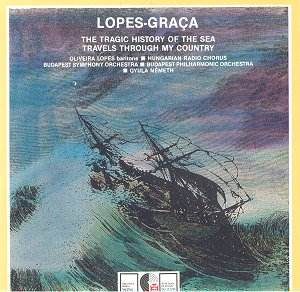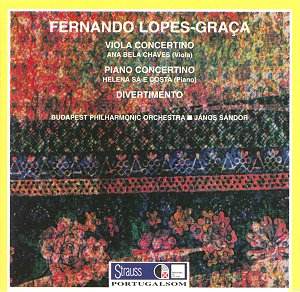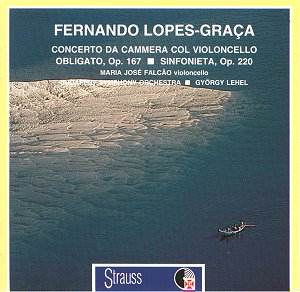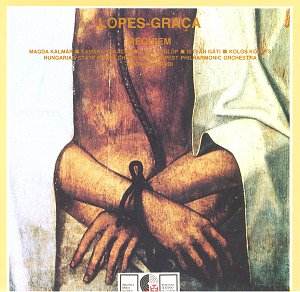Essential biography:
Lopes-Graça is one of Portugal's foremost 20th century
composers. He was born in Tomar on 17 December 1906 and followed the usual
pattern of piano lessons in his home town then formal music college education
in Lisbon in 1924. There he studied amongst others with Luis de Freitas Branco
and Jose Vianna da Motta. He also studied philosophy and history alongside
his musical studies. From the earliest age he was active as a writer on music.
Political affiliations denied him a professorship at the Lisbon Conservatory.
Despite having later won a scholarship he was refused permission to go to
study in Paris. This was again because of his political dissidence. Later
under his own resources he went to Paris to study with Koechlin. While there
he harmonised a series of Portuguese folksongs. The War drove him back to
Portugal. There he indulged in every aspect of musical life especially in
relation to new music. He was responsible for founding the Portuguese Section
of the ISCM. Two strands are apparent in his music: Portuguese folksong and
an affinity for its musical elements (harmony, melody and rhythm) and
Stravinskian neo-classicism (with splashes of de Falla and Bartók).
Rob Barnett
REVIEW OF THE FOUR DISCS
FERNANDO
LOPES-GRAÇA (1906-1994) História
Trágico-Marítima (1943 rev 1959) [32:00] *
Travels Through My Country Suite No. 1 (1954 orch 1969) [18:00]
** Travels Through My Country Suite No. 2 (1954 orch 1969)
16:00 **  Oliveira Lopes (bar) * Budapest SO/Gyula Neméth * Budapest
PO/Gyula Neméth **
Oliveira Lopes (bar) * Budapest SO/Gyula Neméth * Budapest
PO/Gyula Neméth **
 * rec Budapest
October 1974 AAD ** rec Budapest 18-19 Feb 1980 AAD PORTUGALSOM STRAUSS
CD 870003/PS [72:50] * rec Budapest
October 1974 AAD ** rec Budapest 18-19 Feb 1980 AAD PORTUGALSOM STRAUSS
CD 870003/PS [72:50] |

This is the most generous of the quartet of discs under review. The Tragic
History of the Sea is a song cycle with orchestra. Its classic lapping
sea evocation provides a gently rocking backdrop (compare the opening of
Bax's Tintagel) before adding a choral contribution not dissimilar to the
choir in Debussy's Sirènes and Janis Ivanovs' 4th Symphony.
The baritone solo is more recitative than ballad - descriptive rather than
first person immediate. The soundworld reminded me of de Falla's
Atlantida and of Brucknerian horn calls. In later movements we are
treated to catchy themes recalling Braga Santos's Symphony No. 4 decked out
with mystical harp sweeps floating effortlessly up and down, a honeyed serenade
to the accompaniment of dull thuds like distant breakers, bel canto, macabre
bright Stravinskian trumpets; storm effects and a return to the rocking waves
motif so familiar from Bax's Tintagel.
The two Travels suites are bright and breezy folk suites with episodes
taking in the ecclesiastical, an alcohol-enhanced sun-dazed afternoon, Moorish
dances, guitars, raucous pipes and drums, a shade or two of the Berkeley/Britten
Mont Juic dances, village festivities, the repose of a quiet city
and gentle tambourine dances. All very attractive and undemanding though
with enough invention to deliver surprises.
Reviewer
Rob Barnett

FERNANDO
LOPES-GRAÇA (1906-1994)
Viola Concertino (1962) [13:34]
Piano Concertino (1954) [15:15] Divertimento
(1957) [21:00]
 Ana Bela
Chaves (viola) Helena Sá e Costa (piano) Budapest SO/Janós
Sándor Ana Bela
Chaves (viola) Helena Sá e Costa (piano) Budapest SO/Janós
Sándor  rec Budapest 20-22 March 1981 AAD PORTUGALSOM STRAUSS SP4129
[50:20]
rec Budapest 20-22 March 1981 AAD PORTUGALSOM STRAUSS SP4129
[50:20] |

The Viola Concertino is shorter than the similar work for cello. It spans
many moods and episodes including a Moorish dance (with tambourine), Baroque
trumpetry, a chanting songster and a roller coaster at full pelt - all packaged
in a not very memorable shell. The style has references to Rawsthorne and
the later Walton (cello concerto and Britten improvisation. The three movements
are played without a break.
The piano concertino is more engaging seemingly influenced by Milhaud's 1920s
jazziness, Stravinskian outbursts and even the dynamism of the Shostakovich
piano concerto No. 2. The piano part is clipped and catchy with quite a gradual
stamping stride to it. There are stronger romantic elements in this work
than in the viola companion. This coupled with rhythmically and elegantly
accentuated energy makes for a most compelling work for anyone who enjoys
the Shostakovich or Britten's piano concerto.
Stravinsky is again a presence in the Divertimento. This is the jolly
but stainless steel Stravinsky of Pulcinella and Dumbarton Oaks.
A genuine smile comes through in the third movement. There are exotic breezes
perfumed from Macao (we should never forget Portugal's colonial glories),
some raucous antique dances, sly Mahlerian humour, an snowy eclogue, a powerful
Petrushkan dance and finally not a little tenderness.
Reviewer
Rob Barnett

FERNANDO
LOPES-GRAÇA (1906-1994)
Concerto da Cammera for cello and orchestra
(1966) [c.19:30] Sinfonietta (homage to
Haydn) (1980) c[.19:35]
 Maria José
Falcão (cello) Budapest SO/György Lehel Maria José
Falcão (cello) Budapest SO/György Lehel
 rec Budapest
7-10 June 1985 ADD PORTUGALSOM STRAUSS SP4033 [c.39:00] rec Budapest
7-10 June 1985 ADD PORTUGALSOM STRAUSS SP4033 [c.39:00] |

The Concerto may well be familiar to those who bought EMI's Rostropovich
Russian collection. It was written for the great Russian cellist and conductor.
Lopes-Graca's leanings and the mastery of his music guaranteed him a prestigious
Melodiya recording. The Concerto's passionately subdued tones take us deep
into the glutinous clockwork of time. It has the tension of stormy tension
of Rubbra's cello Soliloquy and of de Falla's El Amor Brujo.
It has a subtle avant-garde fragrance recalling the cello concertos of Alan
Rawsthorne and Gerard Schurmann.
The Sinfonietta is lighter, as you might expect. It is still demanding touched
as it is with a fruity neo-classicism but starved of strongly memorable thematic
material. The one exception is the village folksong theme towards the end.
This theme has the rise and fall of Braga Santos's thematic material.
Reviewer
Rob Barnett

FERNANDO
LOPES-GRAÇA (1906-1994)
Requiem (for the victims of fascism in Portugal)
(1979) [47.20]
 Magda Kalmár
(sop) Tamara Takács (alt) Attila Fülöp (ten) István
Gáti (bar) Kolos Kovats (bass) Hungarian State Opera Chorus Budapest
PO/András Kórodi Magda Kalmár
(sop) Tamara Takács (alt) Attila Fülöp (ten) István
Gáti (bar) Kolos Kovats (bass) Hungarian State Opera Chorus Budapest
PO/András Kórodi
 rec
Budapest 3-10 November 1983 AAD PORTUGALSOM STRAUSS CD 870010/PS
[47:20] rec
Budapest 3-10 November 1983 AAD PORTUGALSOM STRAUSS CD 870010/PS
[47:20] |

This is a late work of errantly meandering tonality. It is no more challenging
than Schoenberg's Verklärte Nacht or Strauss's
Metamorphosen. Its soaked textures will, especially in the massed
choral and solo writing, remind you of Herbert Howells' Stabat Mater
and, certainly of Britten's War Requiem.
There are five movements: Introito, Dies Irae, Sanctus,
Agnus Dei, Communio. The Introito is riddled with foreboding
with optimistic lines rising out of the fog. The Dies Irae (the single
largest movement at almost 20 minutes) is saw-toothed with violent assaults
from the brass taking a leaf from Penderecki's book. Anger and resentment
and Brucknerian jagged brass bark out step-down fanfares. The music seems
to speak of the plate tectonics of great change; of those ground down and
of those exalted.
The explosively joyous Sanctus boisterous at first soon collapses
into music for solo violin then gathers itself for violence and a vinegary
gibbering march (3.03). The Agnus Dei conveys a sense of a medieval
clock tolling the passage of time and includes an ululating soprano - calm
and gentle consolation out of the pages of Tippett's Child Of Our Time.
The final communio rises to fill the cavernous space used for this
recording. There is little unalloyed joy and a high quotient of gloom and
stoical resignation. The ululating soprano returns at the close. Definitely
a most moving piece. But for the accidents of geography and cultural barriers
this music would have secured (and may yet secure) the place held by the
War Requiem. For now it stands in the unjustly quiet company of such
unaccountably neglected masterworks as Fricker's Vision of Judgement and
Malcolm Williamson's Mass of Christ the King. Reviewer
Rob Barnett

HOW TO OBTAIN THESE DISCS
All the above discs are obtainable at slightly above bargain price from the
following source:-
The prices are: UK pounds GBP6 and US dollars -10 (freight not included).
The transport costs are :
For UK----- 1 or 2 CDs ------UK£1.60; 3 CDs ----2.5
For USA---- 1 or 2 CDs-----US$3.50 ; 3 CDs --- 5.5
Orders by fax to
fax number 351 1 7141723,
by e-mail to:strauss@mail.telepac.pt
or by mail for attention Eduarda Martins to the address:
Strauss, S.A.
Rua Adelaide Cabete, 3C,
1500-023 LISBOA
Portugal.
Credit cards are accepted with the name of the buyer, credit card number,
validity date and type of card.
Orders and enquiries for this disc to
Strauss S.A.
Rua Adelaide Cabete 3-C
1500 Lisboa
Portugal
phone 01 7151151 - 7143490
fax 01 7141723
